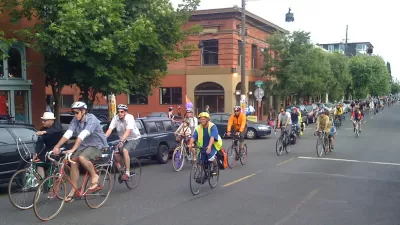State departments of transportation aren't known for being the most progressive public agencies. But, in response to economic and demographic changes, Oregon's DOT (ODOT) is breaking the mold by embracing a multimodal transformation.
"As recent national research and major news headlines continue to reflect a move away from automobile use among major swaths of the American public, and as highway funding levels nosedive, smart transportation agencies are beginning to adapt," writes Jonathan Maus. "To respond to these changes, ODOT has announced 'Intermodal Oregon' a new initiative that will help the agency 'move away from a siloed and highway-centric approach to business.'"
"You can think what you want about ODOT; but these are pretty big words coming from a large public agency," says Maus.
"The Intermodal Oregon announcement continues the trend at ODOT toward thinking about transportation in terms of how to solve problems with the best tools available, instead of simply defaulting toward more — and wider— highways."
FULL STORY: ODOT launches initiative to move away from "highway-centric" approach

Maui's Vacation Rental Debate Turns Ugly
Verbal attacks, misinformation campaigns and fistfights plague a high-stakes debate to convert thousands of vacation rentals into long-term housing.

Planetizen Federal Action Tracker
A weekly monitor of how Trump’s orders and actions are impacting planners and planning in America.

San Francisco Suspends Traffic Calming Amidst Record Deaths
Citing “a challenging fiscal landscape,” the city will cease the program on the heels of 42 traffic deaths, including 24 pedestrians.

Defunct Pittsburgh Power Plant to Become Residential Tower
A decommissioned steam heat plant will be redeveloped into almost 100 affordable housing units.

Trump Prompts Restructuring of Transportation Research Board in “Unprecedented Overreach”
The TRB has eliminated more than half of its committees including those focused on climate, equity, and cities.

Amtrak Rolls Out New Orleans to Alabama “Mardi Gras” Train
The new service will operate morning and evening departures between Mobile and New Orleans.
Urban Design for Planners 1: Software Tools
This six-course series explores essential urban design concepts using open source software and equips planners with the tools they need to participate fully in the urban design process.
Planning for Universal Design
Learn the tools for implementing Universal Design in planning regulations.
Heyer Gruel & Associates PA
JM Goldson LLC
Custer County Colorado
City of Camden Redevelopment Agency
City of Astoria
Transportation Research & Education Center (TREC) at Portland State University
Jefferson Parish Government
Camden Redevelopment Agency
City of Claremont




























